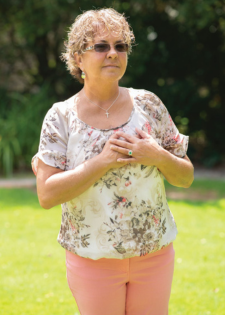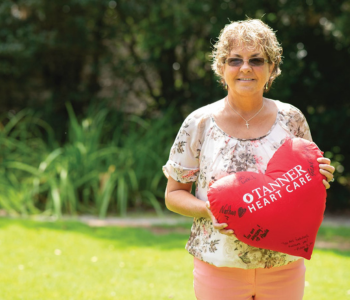As Penny Freeman laid in her bed, the thought that couldn’t leave her mind: “If I fall asleep now, I’m not going to wake up.”
She forced herself out of bed — but couldn’t make herself believe that she might be having a heart attack.
A strange feeling
“I’m usually the caregiver,” said Freeman.
She’s a mom to 15-year-old twin boys, a 37-year-old son and a daughter-in-law, plus a grandmother to two grandchildren, all of whom recently moved into the same sprawling, two-level home in Bowden.
.png)
That new home was just remodeled, and Freeman and her family had been staying with other relatives. All the stress meant that while Freeman was caring for her family, she wasn’t taking the best care of herself.
High blood pressure runs in her family, with her mother and older son both on medications.
“I was not very good with my blood pressure medication for about nine months prior,” said Freeman. “I got on this, ‘Why am I taking so many meds? I don’t feel bad.’”
One Saturday morning, Freeman woke up “not feeling normal.”
She already knew her blood pressure was high; she’d been scheduled to have a tooth pulled the previous Tuesday and the practice “wouldn’t touch me,” she said. “My blood pressure was outrageous. I knew that I needed to follow up with a doctor and get back on my meds.”
She’d started taking her medications again on her own and was working on the doctor’s appointment — since the move, she needed to change physicians. But then came that odd feeling on Saturday morning. It wasn’t pain, “but I wasn’t feeling well.”
Freeman tried to go about her day. She and her sons went to Carrollton to get lunch at Zaxby’s. But she couldn’t get over the feeling that something was wrong.
“God was trying to tell me something,” she said.
Finally, she called her daughter-in-law, Christian Parlier, an ICU nurse, to ask if she should go to urgent care or come back home. They talked about her symptoms, until Parlier finally asked, “does it feel like pressure, like someone’s sitting on your chest? Then you need to go to the hospital immediately.”
Terrified, Freeman did a U-turn on Highway 27 and drove herself and her sons to the emergency department at Tanner Medical Center/Carrollton.
“I was so worked up, I just patted my chest,” Freeman said. “I couldn’t talk because when I would start to talk, I would start crying. When my daughter-in-law was like, ‘yes, get to the hospital,’ it was, ‘Oh my God, am I really having a heart attack?’”
From heart attack to bypass
The man at the desk understood her hand signals and asked if she was having chest pain.
Freeman nodded, and after getting her name and date of birth, Tanner’s emergency department staff immediately got her into a room and started an electrocardiogram to check her heart’s electrical activity and ran bloodwork.
Her son arrived to pick up his brothers while her daughter-in-law came to stay with her. It felt like only minutes before Rajat Jhanjee, MD, a board-certified cardiologist and electrophysiologist at Tanner, introduced himself and told her that her bloodwork showed specific biomarkers that indicated she’d experienced a heart attack.
Freeman still assumed she’d be monitored and would go home the next day.
“I was feeling fine,” she said, “but my daughter-in-law told me, ‘That’s because they gave you medication, and that’s why you’re feeling OK.’”
Freeman spent Sunday anxious to get home, and on Monday she had an echocardiogram and underwent cardiac catheterization to further examine her heart and potentially place a stent.

The staff told her, “When you wake up, if everything’s OK, you’ll be back in the room you were in. If we have to go ahead and put in a stent, you’ll still go back to the third floor, but to a different room.”
Instead, Freeman woke up still in the cath lab.
“You’ve got several blockages,” she remembers them telling her. “We think the surgeon should take a look.”
For Freeman, who’d only ever had one other surgery in her life — to remove a cyst from her left wrist when she was in the eighth grade — the prospect of open-heart surgery was a shock.
“It didn’t feel real to me,” she said.
She met Tanner cardiothoracic surgeon Omar Lattouf, MD, physician assistant Gene Coughlin, PA, and nurse practitioner Cody Connell, NP-C, who explained what would happen next.
“Coronary artery bypass surgery treats blockages in the arteries of the heart by using blood vessels from elsewhere in the body to replace damaged vessels,” said Dr. Lattouf.
With three blockages in her coronary arteries, Freeman would undergo a triple bypass, using blood vessels taken from her legs.
Dr. Latouff gave her options: “We could do the surgery tomorrow or wait until Friday.”
“Let’s get it over with,” she said.
Undergoing open-heart surgery at Tanner
She was moved to cardiac ICU where her prep began, including more tests and bloodwork, shaving and a shower with a special soap.
She met with anesthesiology, and Connell sat down with her and her daughter-in-law — who was able to spend the night with her in her room — to explain what would happen during the procedure.
Her anxiety could have crept up again, but Freeman credits her nurses, Joni Cox, RN, and Michelle Harper, RN, who chatted with her about family, their jobs and their lives.
“They were so calm, and their calmness helped me to be calm,” said Freeman. “They were so encouraging and just the sweetest. Very easy to talk to, and it just helped me keep my mind off things.”
The morning of surgery, she bathed one more time, and received medication to help her relax. Her nurses covered her in warm blankets and she was wheeled down to the cardiothoracic operating suite.
The next thing she knew, she woke up in recovery.
Freeman remembers a nurse calling her name and waking up still intubated. She was asked to breathe “like she was breathing through a straw.” She drifted back to sleep and woke up again in her room, without a breathing tube, and being fed ice chips by her nurse.
During her recovery, dry mouth was “the hardest part,” she said. Because she couldn’t drink yet, she used ice chips and a special sponge applicator to rub water on her lips and her mouth.
She remembers too being told that Dr. Lattouf typically keeps his patients in the operating suite a little longer to ensure there are no complications.
“Thank goodness he does,” said Freeman, as she “threw” a blood clot, and Dr. Lattouf reopened her to remove it.
The next day, it was time to get up and walk. During her surgery prep, Connell had given Freeman a heart-shaped pillow that he drew on with a marker to show her where her blockages were and how they would build the bypass vein with an artery from her leg.
“That pillow was my friend” during recovery, said Freeman, who hugged it to help support her chest muscles when she was rocking in bed to sit up and then get to standing.
During the next three days, Freeman walked as much as she could. Two drainage tubes were removed, then the last two.
Her daughter-in-law bought a recliner for Freeman to sleep in during her first days at home and found a shower chair. Her nurses told her that she was a “star patient,” and when on Sunday, Coughlin told her she could go home that day or stay one more night, Freeman immediately said, “home today please.”
Strong support
At home, Freeman had a strong support system around her — her brother, her sons and daughter-in-law and her mother.
The first few days were hard.
“Everything bloomed while I was in the hospital,” she said — and her pillow was a life-saver as she hugged it when she had to sneeze or cough. 
She was on her pain medications for only about a day longer and had a machine that provided suction on her incision for about a week. She slept a lot, but by that weekend “I was feeling really good.”
The dressing and machine came off next, and that next week she was listening in on meetings and calls at work and was easing in by doing a little laundry.
By the third week, “I was back at it,” she said.
Today, Freeman still has a little lingering swelling in her left leg where the blood vessels were removed for her bypass. Cardiac rehab at Tanner is helping; she’s going three times a week and is up to seven minutes on each machine and is lifting three pounds.
She’s also changed her diet — “I was a salt girl,” she said — and potato chips and salting her watermelon are no longer parts of her diet. “I’m just trying to eat better, take my meds and take care of myself. I’m paying attention to that.”
In the meantime, she was cleared by her doctors at Tanner to go to Six Flags Over Georgia — she and her family are season pass-holders — and she just returned from a cruise to Aruba, Bonaire and the Dominican Republic.
She’s still a caregiver, but she also recognizes that she, too, deserves attention.
“I think that as moms, we take care of everyone else and not ourselves,” she said.
Her biggest lesson is “know your body. Recognize when something is not right. It’s really just paying attention to how you’re feeling.”
She also gives credit to Tanner.
“I felt like their only patient when I was there,” said Freeman. “I was a priority from the minute I walked in the door, touching my chest and not being able to speak, to when I left. The nurse manager came and checked on me, the anesthesiologist came the day after. Dr. Jhanjee saw me over several days. They were all so super nice and caring toward me — calm and soothing. If I started getting nervous, they brought something to help with my anxiety. When they had to get me up, they were very patient and didn’t rush me. I could go at my own pace. I would recommend anyone to go there, they were fabulous.
Her daughter-in-law works at another local hospital “but I’m trying to get her to move to Tanner,” she joked.
More on Tanner’s heart care services — including open-heart surgery — can be found at TannerHeartCare.org.